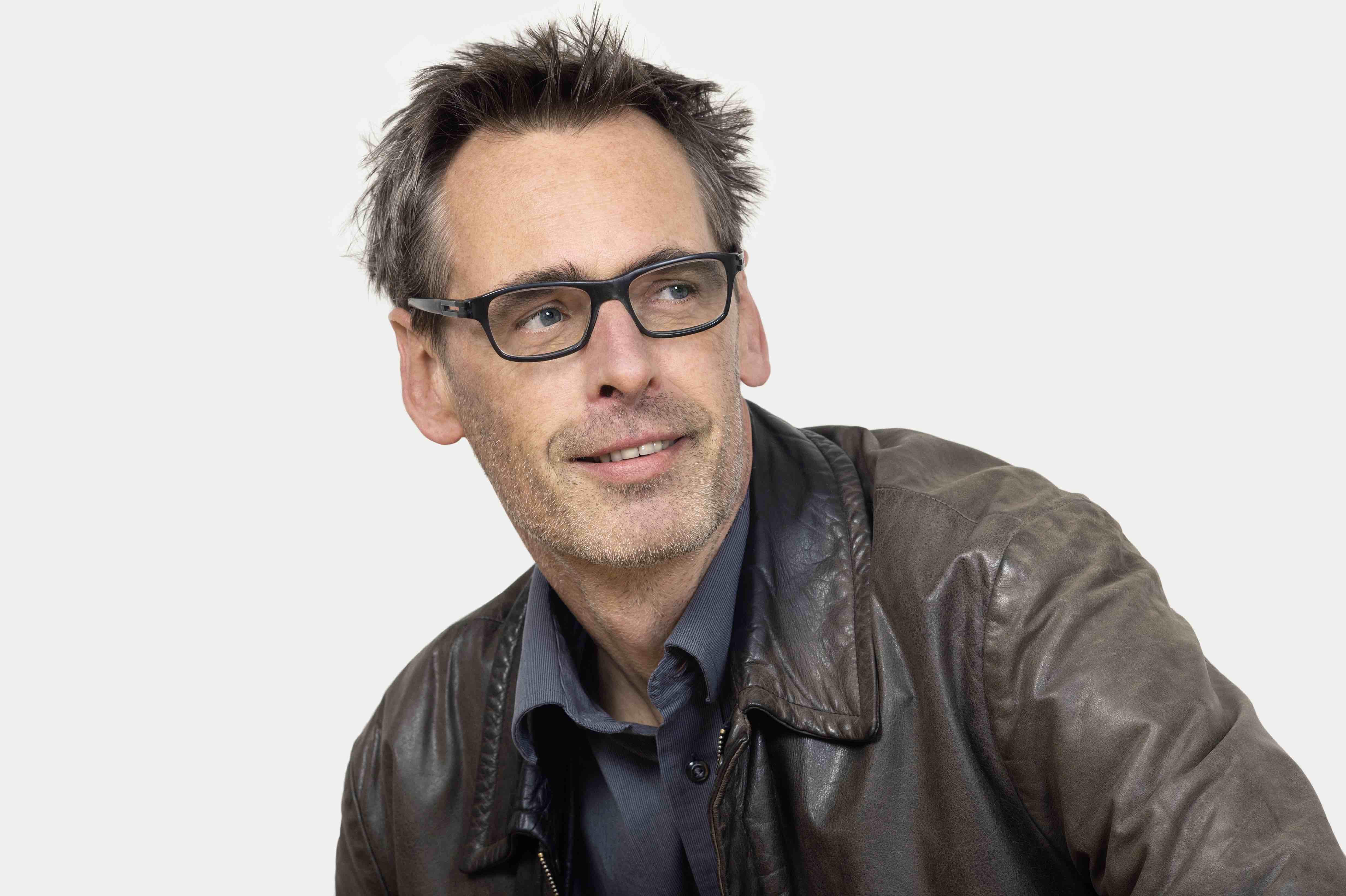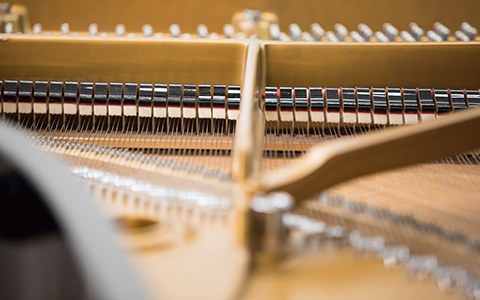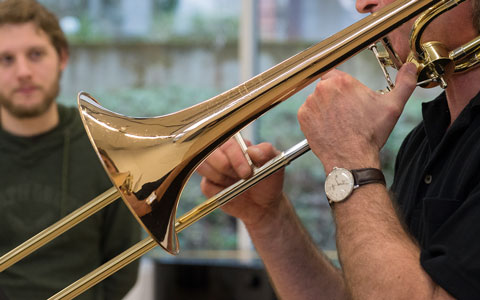MA Specialized Music Performance | New Music Theory
Hochschule für Musik Basel
This sonic space basel matrix offer combines theory, practice, science and artistic research. The master’s degree focuses on the theory formation of the 20th and 21st centuries and its application. It expands the concept of theory on an interdisciplinary and transdisciplinary basis and combines aesthetic-scientific discourse with a practice-based and artistic approach.
.png)
- Aesthetic-scientific discourse, practice-based and artistic approach
- Combining theory, practice, science and artistic research
- Focus on 20th and 21st centuries
Steckbrief
Zukunftsaussichten
Learning outcomes
The aim of the programme of the Master of Arts FHNW in Specialized Music Performance, field of study New Music Theory, is to enable students to understand, reflect on, formulate and communicate music theory at the highest level, both orally and in writing (e.g. in university teaching in the main subject are). This includes comprehensive theoretical knowledge of music of the 20th and 21st century and its sociopolitical and aesthetic connotations. Further skills will be acquired in the field of systematic musicology.
Career prospects
The specialization in the broad history of theory of 20th/21st century and the ability to develop creative theory offers a broad range of career opportunities and qualifications in the professional fields of contemporary art. Career opportunities range from university teaching in the field of music theory as a major subject to music publishing, entry into practical and/or theoretical music research and related doctoral study. Graduates can also make a name for themselves as curators, ensemble leaders or festival organizers in the analogue and/or digital music market.
Target audience
The course is aimed at applicants from the fields of performance, composition, music theory and musicology as well as career changers from related artistic disciplines who are experienced in transdisciplinary work.
Why is New Music Theory needed?
How can we analyze music in a modern way?
What does make a piece to a good piece?
Prof. Uli Fussenegger in conversation with Dr. Christoph Haffter (in German)
Aufbau und Inhalte
New Music Theory focuses on the 20th and 21st centuries and offers an aesthetic-scientific discourse as well as a practice-based and artistic approach in the unique multifaceted creative environment of sonic space basel.
Focus on today
Even though the theoretical approaches, concepts and discourses of the 20th century are extensive, diverse and well-documented, music theory of the 20th and 21st centuries has only played a minor role in university teaching so far.
The specialized Master's degree in New Music Theory completes the Music Theory programme at Basel Academy of Music. This new matrix programme combines theory, practice, science and artistic research.
The Master's degree focuses on theory formation in the 20th and 21st centuries and its application. It extends the concept of theory in an inter- and transdisciplinary way and repositions the approaches, methods and knowledge of the subject. The course combines an aesthetic and scientific discourse and a practical and artistic approach. New Music Theory is a unique study programme in the international landscape of music academies, in combination with the broad field of contemporary music practice in the environment of sonic space basel.
The highly modularised curriculum gives students plenty of scope for independent activity in projects both on and off campus, allowing them to tailor their studies to their individual needs. The open format of the sonic space basel teaching modules promotes interdisciplinary approaches and collaborative work.
Modules and Reglements
The BA and MA degree programs at the Basel Academy of Music are based on modules.
The legally binding structure provides an initial guide to the content and weighting of the subjects on the degree program.
The detailed content and modalities of the individual subjects can be found in the module descriptions.
The study regulations come into force together with the study and examination regulations of the Basel Academy of Music FHNW and form the legal framework.
Vertiefungen
International
Leitung und Dozierende

Leitung und Koordination sonic space basel: Komposition, Musiktheorie, Audiodesign, Open Creation, Zeitgenössische Musik und Neue Musik Theorie

Dozierende Musiktheorie und Komposition

Dozierende Klassik
Unsere international renommierten Dozierenden auf einen Blick.
Voraussetzungen, Zulassung, Eignungsabklärung
Admission criteria
In order to enter the FHNW Master of Arts in Specialized Music Performance programme with a New Music Theory Major, applicants must be awarded a Bachelor (instrumental/vocal, Composition or Music Theory) or equivalent as well as they must have passed the entrance exam and were offered a free place at the Academy (limited places).
Applicants who have submitted all the necessary registration documents in time and have passed the first round of the entrance exam will be invited for the entrance exam by mail and by videoconference.
For further information on the admission criteria, please see the Study regulation of the Master of Arts FHNW in Specialised Music Performance.
Required skills
- Very good knowledge of music theory due to training in Composition, Music Theory, instrumental or vocal performance
- Potential to develop an independent artistic personality capable of analysis and reflection
- Particular aptitude for interdisciplinary work
- Particular aptitude for scientific and artistic research-orientated work
Language Skills
We expect students to have sufficient German language skills at the beginning of the studies. Students who are not German native speakers must present a B1 German language certificate according to the Common European Framework of Reference for Languages (CEFR) at the beginning of the studies. This certificate must be complete, i.e. all modules (reading, listening, writing, speaking) have been tested separately and passed at least at level B1 overall. Only certificates that have been certified with the ALTE-Q-Mark seal of approval (e.g. the B1 certificate of the Goethe-Institut or the telc certificate) are accepted. The required certificate B1 must be submitted with the confirmation of admission but not later than 31st May. Exceptions will be decided upon by the head of degree programme.
Furthermore, a very good knowledge of English is recommended.
Organisatorisches
sonic space basel
sonic space basel is a Platform of Basel Academy of Music for Audio Design (BA and MA), Composition (BA and MA and MA SP), MA SP Contemporary Music, BA Music Theory Major, MA MP Music Theory, MA SP New Music Theory, MA SP Open Creation and Research.
We consider ourselves a laboratory, a communication tool and an information hub for contemporary music.
Projects / Ensembles
At Hochschule für Musik Basel, students have the opportunity to participate in various project and ensemble programmes.
To the overview of the recurring offers.
Quicklinks
- Welcome: A brief overview
- Studying in Switzerland
- Tuition fees & Financing
- Scholarship
- Module descriptions

